#but I did so 🤷🤷🤷🤷🤷🤷
Explore tagged Tumblr posts
Text
George Karizaki and the Tragic Clown Paradox
(aka) The George Karizaki Dilemma — My George Character Analysis
WARNING: This essay goes into dark topics such as child abuse, trauma, and many other touchy and sensitive topics. Read at your own risk, basically. Also contains spoilers up to episode 48 of Revice.
Warning, again—sensitive topics ahead.
big thanks to @alpona for inspiring me to actually write and post this.
My Interpretation of the Inner Demon Reveal
Vulnerability is defined in the Oxford Dictionary as: “the quality or state of being exposed to the possibility of being attacked or harmed, either physically or emotionally.” George Karizaki is a character that uses humor to disguise vulnerability. On the surface he comes off as more of an unbothered-genius, or mad scientist archetype. He works on what he likes, moral or not, all with an infuriating cocky-smile on his face. But humor isn’t the only thing George uses to hide his vulnerabilities, the very mask of ‘mad scientist,’ or a ‘villain’ caricature/persona is one of the other substantial ways George disguises his own traumas, fears, and pains. At the heart of it all, George cannot be analyzed without being placed in the “Tragic Clown Paradox.” Or— the ‘sad clown paradox’ as wikipedia calls it.
Wikipedia defines said paradox as: “The contradictory association between comedy and mental disorders such as depression and anxiety.”
More specifically, the link between humor and trauma. The paradox here, of course, being the fact that clowns—who are associated with laughter, fun, etc.—are actually the saddest or perhaps loneliest individuals in the room.
This analysis seeks to examine George Karizaki as a character: how he’s being presented, his type of humor, and most importantly—how it all relates to his trauma.
First on the list of analysis then, is the clown archetype and why I think George fits particularly well into it, and what that might mean for the character. In the article “The Great Comedians: Personality & Other Factors,” Samuel S. Janus states:
“The world of theatre has always found meaningfully symbolic the alternate faces of comedy and tragedy. Historically, court jesters were tragicomic figures— the embodiment of the bittersweet of life. Among the oppressed, the role of social critic has been the comedian's forte. Freud indicated that humor is a release for anxiety, to quote Abe burrows: ‘The comedian must practice his comedy in order to avoid destroying himself.’ Jack Carter, another leading humanist, says: ‘the funny part, the laughter, is given to the audience, but the comedian is left with the bitter dregs.’ Comedy has been described by a leading theologian as: ‘The ability to laugh at one’s own tragedy.’”
This is a particularly powerful section looking at the role of the tragicomic—the jester, the clown; and just how entwined with tragedy said comic is. Now, examining George’s portrayal in the show, fifty-one seconds into the first episode of Revice we are introduced to George first via his voice-over explanation about the Giff stamp. Then he brings up the idea of fighting demons with demons and with a snap of his fingers he brings up Daiji’s profile. Here we see George as a confident scientist. He obviously has a plan and knows what he’s doing. All, as stated previously, with a cocky-smile on his face.
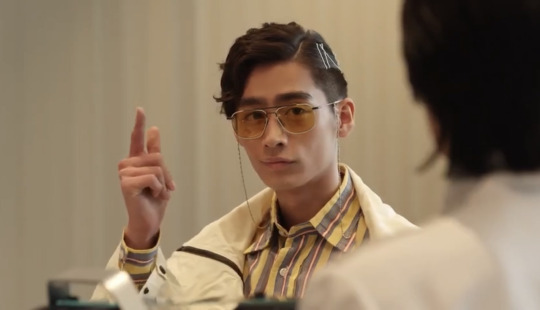
At Daiji’s coronation he cuts off Hiromi and pushes him humorously out of the way, saying he’s ‘taking too long.’ (This is notably also the first episode where we hear mention of his father and/or his father’s scientific legacy.) During the entire attack at the coronation, George is shown to be one of the only people not panicking. He’s rational and level-headed, even warning Hiromi not to try using the vistamp because it would be too strong for him. But then refusing to intervene or do anything more, letting Hiromi go through (and fail) at transforming. Simply stating: “See?” when things go wrong. This—from the standpoint of the audience, is also quite humorous.
George takes on this theatrical jester archetype throughout the entirety of the series, sarcastically commenting on the sidelines as things take place within the central plotline. Like with Hiromi’s failed henshin. In “Fools are Everywhere” Beatrice Otto takes notice that ‘It is the nature of jesters to speak their minds when the mood takes them, regardless of the consequences.” In fiction, and real life, jesters employ a variety of skills. Such as storytelling. In fact, the modern term derives from gestour, or jestour, Anglo-Norman (French) meaning ‘storyteller’ or ‘minstrel.’ (Wikipedia) Jesters have a privilege of mocking/stating the truth to those in power (King) and being able to get away with it. George Karizaki is shown (like in episode 1) to mock, narrate, or comment on a situational folly or irony—again, such as Hiromi’s failed transformation.
There are, of course, other notable instances of George’s jester antics—such as in episode 2, when Hiromi is informed he’s been demoted. Stating: “Your disgraceful failures to protect our Vistamp research labs AND inauguration ceremony have led you here.” So truthful and mean that you, as the audience, can’t help but feel bad and be amused. But instead of ending it there, George puts on that mocking smile of his and says in English, “Don’t mind, Hiromi.”

George, like most jesters, are passive commentators rather than active forces within the narrative. They spectate. In fact, the most active thing George does is create vistamps to be used, which is barely, if ever, shown on screen. Yet somehow George still manages to manipulate and dictate main storyline events. Often working as the catalyst for something to happen in the episode. Such as when he gives Daiji a henshin device, or when he sticks a tracker on something stolen from their base in episode 14/15.
Moving on to his sense of humor, George’s humor is a mix between self-enhancing humor that: “Involves a generally humorous outlook on life, a tendency to be frequently amused by the incongruities of life, and to maintain a humorous perspective even in the face of adversity,” (Like George at the coronation in episode 1), and Aggressive Humor which “relates to the use of sarcasm, teasing, ridicule, derision, ‘put down’ or disparagement humor.” Both are used to enhance the self, and the second is used to enhance the self at the expense of others, specifically.
In Scott Kaufman’s and Aaron Kozbelt’s study, “The Tears of a Clown: Understanding Comedy Writers” they look at these types of humors and found self-enhancing humor to be positively correlated with social support and optimism, suggesting an optimistic outlook on life is closely linked to using humor for coping, perspective taking, and emotional regulation. On the other hand, they found aggressive humor to be positively correlated with self-report measures of hostility and aggression. We have seen George employ both kinds of humor throughout the show. Especially aggressive humor. This shows that George, as a person, is someone who uses comedy to cope and emotionally regulate himself, aka: He builds himself up by taking others down. I stated at the beginning that George uses humor to hide vulnerability, and to give himself a sense of control. As George—though it might not be obvious at first glance—is someone who hates loss of control, as it puts him in a vulnerable position and reminds him of his past trauma, which I’ll get to in a minute.
Above is a video of George putting on his Villain persona in response to Hiromi lashing out at him
Janus states that, “there appears to be an awareness on the part of the audience of the relationship between humor and anxiety. Consequently it would be reasonable to assume some awareness of the fact that comedians are very anxious and often depressed people. (...) Humor, then, can be seen to be especially applicable in situations in which the individual feels himself to be powerless.”
Power, powerlessness, control, and lack of, are all important elements of George Karizaki’s character and the clown mask he uses to cope with his past and his present. In Janus' study on the relationship between humor and anxiety, he found that the early lives of all the subjects were marked by suffering, isolation, and feelings of deprivation; and I quote:
“Humor offered a relief from their sufferings and a defense against inescapable panic and anxiety. The presence of these same needs and ears almost universally accounts for the success of these particular individuals as humorists. The fact that humor is a language of protest to mitigate their anxiety and permits them to function. (...) It is felt that comedians are able to convert their rage from physical to verbal assault and that for many their comic routines are a form of acting out. (...) They (comedians) are keenly sensitive people who have an uncanny perception of the needs and fears of their audience.”
Losing his father at such a young age and with no information about a mother, other than the mention of her not being around/gone, I think it is safe to assume George grew up an orphan without parental role models in his life. But not having parents is not George’s only trauma.
(And here’s where my take becomes hot ….lol)
George was forcibly given his father’s inner-demon as a child. This is obviously a metaphor for the passing down of generational trauma. It is also a form of child abuse. If we examine the facts, which are: (1) the father inserted his demon into George’s body without his consent, (2) this hereby violates George’s sense of self/his bodily autonomy, (3) as stated above, it’s child abuse. You don’t use a kid as an experiment and violate his control over his own body and not have that qualify as child abuse. George had to have been about 4-5 years of age at the time. That’s messed up. Though he might not recognize it subconsciously, this is another reason George hates lacking control.

He’s already had things taken from him (i.e his parents) and things done to him (inner demon) all outside of his control. Then he had to grow up in that environment of deprivation and abandonment, where all he had left was his father’s inner demon and a legacy to live up to. This is also why Geeorge has the tendency to mask as a villain when confronted/put into an uncomfortable situation. It’s self-protection. “People lash out so that they can reject before they get rejected or abandoned. It is a way for the person to feel more in control, which makes them feel safer.” (‘Why do people lash out’ by Dr. Monocle Borschel) Some people with trauma lash out because they go into fight or flight mode when they feel threatened.
To George—being vulnerable is putting himself out to be exploited. So he masks behind aggressive humor and villainy instead.
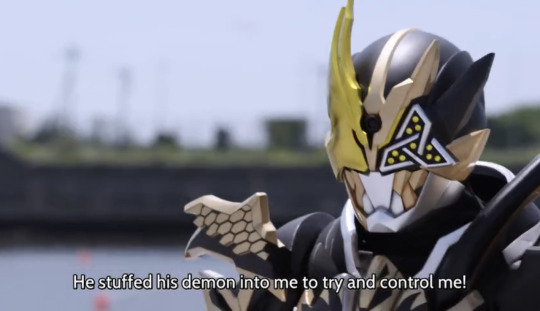
Now, onto George Karizaki’s dilemma.
One of the ways the George inner-demon reveal can be read (aka the way I read it) is as a metaphor for CSA. (Child Sexual Abuse.) How the scene is shown, the translation, and the fact that George’s bodily autonomy is being violated by his father, is why I came to this conclusion. This would also further explain George’s unusual sexual-coded interest in older men/father figures/authority figures. Victims can seek out the same type of abusers in order to have “control” over their own situation this time around, ergo “winning.” Though it never quite does work out that way. Either way, basically, if George is flirting/making the advances, then he has the control.
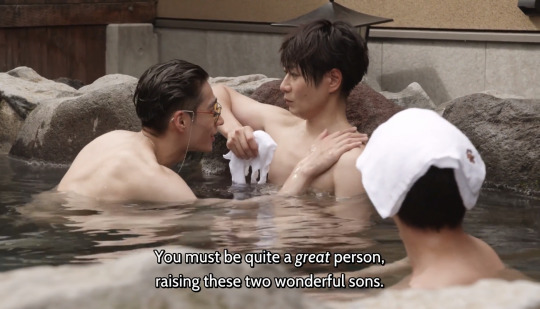
All throughout the show George is usually the one to initiate physical contact with others, not the other way around. And when it is the other way around? George has never once reacted positively, instead forcibly removing the hand/touch from his body.
Of course, this might’ve just been the actor being silly/doing something he finds amusing, for when he does things like flirting with the Igarashi father in episode 8 at the hot springs. But it still shouldn’t be ruled out imo.
One of my first questions at George's inner-demon reveal was: “How does this differentiate from the intergenerational trauma passed down to Ikki from his own father?” Ikki’s situation (mostly with Vail) is often seen as a physically and emotionally abusive relationship. Ikki literally uses himself as a shield to protect his other siblings from his father’s inner demon. Vice, Ikki’s own inner-demon, is modeled after Vail, his father’s demon. Vail caused Vice to be created. I could wax poetic on this forever. But in examination and comparison to George’s situation, I found that the difference was in the actions the fathers took. Genta failed to protect his family from his inner-demon and hurt them, both physically and emotionally. But, George? George’s sense of bodily autonomy is being violated. His father, in fear of losing his son, decides to do something to his body that can never be undone; and he does it in his sleep. All without George knowing or realizing what’s going on.
The entire situation reads to me as CSA.
That’s the difference in the traumas being passed down; because unfortunately, it is a common fact for victims of CSA to become perpetrators of it when they’re older. Once again it’s about revisiting the trauma but from the winner’s side. Which is a disgusting thought process/reasoning, but that is the underlying motive. Now, was his father abused that way? As the audience, we can’t be sure. We know from separate Revice releases that the father, Masumi, worked as a scientist in a position lacking power—but that’s all we really know about his side of the story. The only thing that hints at it being like that is the knowledge of this being an intergenerational trauma being passed down from father to son. Literally, the same inner demon. Plus, the fact that it is being passed down from body to body.
This is George’s essential dilemma—how he should view his father who was a good dad in most aspects up until the inner-demon insertion, and abandonment.
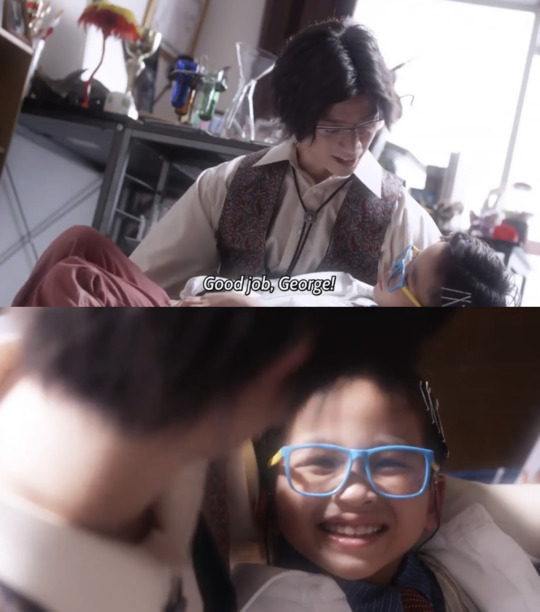
This is why George states that it would be easier to forgive his father if he were really dead.
The entire scenario does nothing but fill George with turmoil. How can he reconcile these two facts? The good and loving memories versus the abandonment and bodily autonomy violation. The bad things should make his father irredeemable, unforgivable, evil. But he was still George’s father. One who gave him a majority of good memories when he was around. The situation here isn’t black or white but a complex gray area.
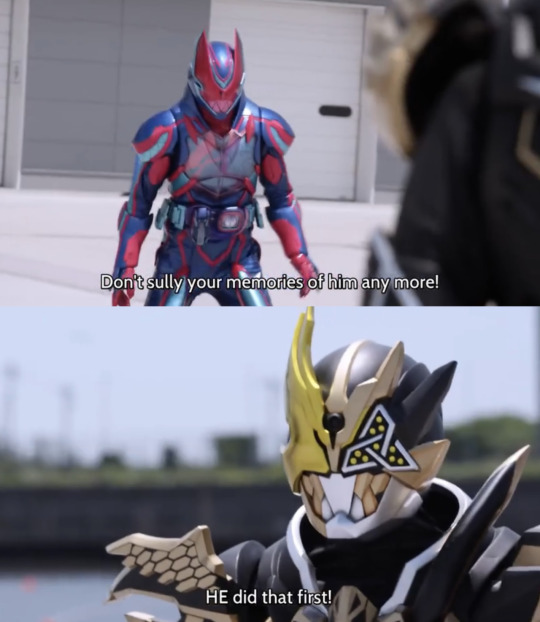
Even Chic, George’s inner demon, shows aspects of this: George and his father’s love for science (good)—but twisted into something ugly, and, humor—George’s way of coping. A perfect mix of the trauma and how it both drives George/causes him to react a certain way (masking, etc.). That’s what Chic represents. A trauma inherited from his father.
So, George Karizaki is a “tragic clown paradox” because of this gray situation he finds himself trapped within. It’s a lose-lose. The jester’s met his match. Humor finally wasn’t enough to mask his pain. So George did the next best thing: he became the villain. (Juuga)

A few things to note now that we’re coming to the end of my essay: (1) this situation reminds me of two other things—Perks of Being a Wallflower (Charlie), and Eliot’s situation in Mr. Robot. In BOTH cases (spoiler) the MC has been a victim of CSA by someone close and very dear to their heart. In Perks it’s by Charlie’s favorite person—his aunt, and in Mr. Robot it’s by Eliot’s father. Both Charlie and Eliot repressed these memories and went on remembering their abusers as people they really loved and who really loved them. Yet, once they remember what happened to them…sh*t hits the fans. Here’s a clip from Perks of the scene where Charlie remembers/finds out what happened:
WARNING: The videos below might be triggering, watch at your own caution.
youtube
Here’s a clip for when Eliot finds out:
youtube
In both, finding out had (obviously) detrimental effects on them. But even before that, their trauma is shown subconsciously. For Eliot, his personality split in order to protect himself. For Charlie, his depression and suicidal ideation. The same can be said for when George finds out. George literally slowly loses his mind, with the catalyst of his father dying adding to previous stress, and instead tries to destroy his father’s legacy by attacking his friends. All so that he can feel more in-control. All so he can feel he has power over his father. So yeah, Charlie and Eliot’s stories reminded me a lot of George’s, which only strengthened my previous assumption of his inner-demon metaphor being about CSA trauma.
Other things to note: (2) George uses touch to manipulate others, often initiating contact when trying to get someone to do something. Such as an arm over shoulder. For George, this can show that to him, touch equals power and control. Especially over others. (3) I think this is one of the reasons why George works out a lot. He worked out enough so that if someone touches him, he can physically remove the touch himself. No more letting others have control over his body without his consent.

#yeah this is triggering#yeah its totally my interpretation of the inner demon reveal#yeah the writers probably didn't mean for it to be interpretated this way#but I did so 🤷🤷🤷🤷🤷🤷#I hope this analysis at least explains my thought process somewhat#I know this is a hot take but its the way my brain saw the scene#and it's been like that ever since#(clown noises)#kamen rider revice#kronthescoup#ikki why is ur demon so cringe#revice analysis#george karizaki#george karizaki analysis#revice#kr revice#revice spoilers
11 notes
·
View notes
Text
I dont get people who write a Wyll that gets nervous and an Astarion who doesn't. Wyll gets tortured in front of the group and still doesn't miss a beat, aside from if you let his father die, I think there's only one or two lines where his dialogue strays from "affable/charming". Good luck trying to get through that shell, lol. Meanwhile Astarion has dozens of shrill, nervous, panicked dialogue lines. Astarion is a character who is influenced strongly by player choice and never goes it alone whereas Wyll leaves the camp if you fuck him around too much.
I feel like if you make Astarion cool and suave you are falling for the façade that is supposed to be deconstructed by the viewer and if you make Wyll fumbling, naïve and nervous you are forgetting that this man has been locked in a 24/7 one-on-one psycho-sexual mental battle with a billion-year-old demon from the 9th circle of Hell for the entirety of his adult life at this point, so. Jot that down.
#wyll ravengard#astarion ancunin#wyllstarion#logged#bg3#the immediate effects of it are less present in the text so I do understand somewhat but people who act like wyll is traumafree#or only/primarily has issues with his dad are like. what game did you play 🤷 killing mizora is literally his hearts desire
3K notes
·
View notes
Text
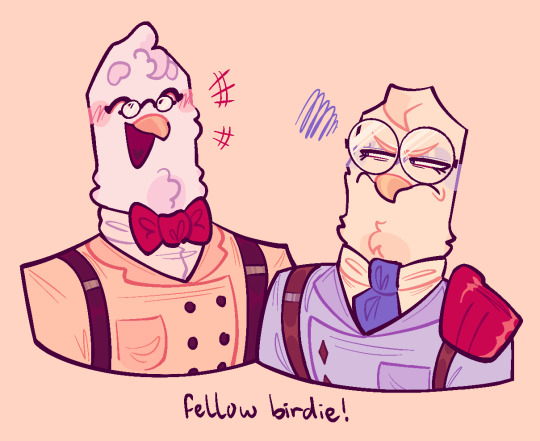

If there’s a pootis and a blootis
Does that mean that somewhere out there, there exists a
A redimedes
#digital art#art#tf2#lil pootis#medimedes#tf2 lil pootis#tf2 medimedes#I don’t know if this counts as a pootis oc so I’m not gonna claim it is one#unless quazies is alright with it 🤷#yes I did draw this just to make the joke
2K notes
·
View notes
Text
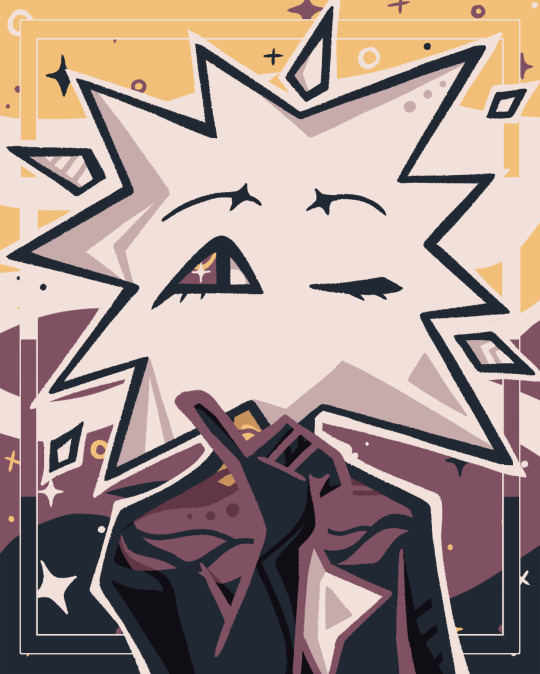
Loop, Loop, my friend Loop
#in stars and time#isat#loop#isat loop#loop isat#josh art tag#this one was kinda challenging lol#first of all: loops face shape#2nd: the black of their body was the same as the lineart so i had to color the lineart purple by their hand#in order to make it visible#and finally i had to add a border to the rectangle in the background of the nombinary flag to make it more visible#i considered not including it but i did it with mirabelle and sif and i want all these 2 match so 🤷
827 notes
·
View notes
Text
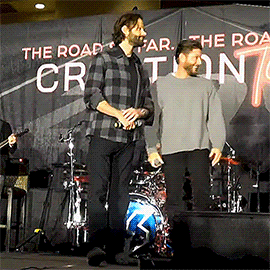
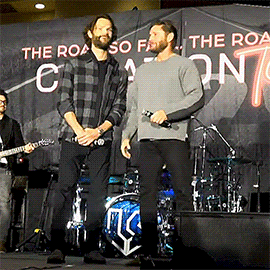
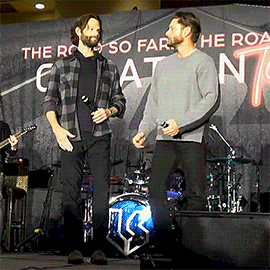
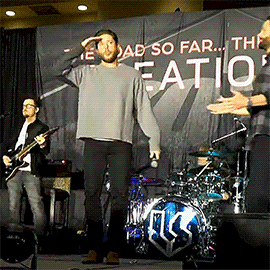
jared padalecki and jensen ackles nashville con 2024 - main panel
#saw these moments in other gifs - the quality of the videos available are rough so i went looking to see if anything else was up#didn't find anything new so i did my best to clean them up#i usually keep my j2 posting to them being serious or funny but#they were extra huggy and it was cute and i wanted to provide a service? 🤷#j2#jared padalecki#jensen ackles#mygifs#j2gifs#i had to make them tiny because i didn't have many pixels to work with#i get kind of twitchy and self conscious about the j2 stuff i post. it's silly.
269 notes
·
View notes
Text

ugley babeis
#delta got decapitated in this timeline but we don't see the body so 🤷#did no one made this when this format was popular it is literally them#zero escape#zero time dilemma#phi zero escape#delta ztd#ztd spoilers#I am trying to think about them for writing purposes so I stopped everything I was doing to make this when I realized how well it applies
108 notes
·
View notes
Text

Mess with my landoscar 😤 McLaren strategy count your days 😤😤
#blanket gifted by me 😚🤗#did i draw this to process and cope with that *messy* ass race#why yes yes i did#i needed them cuddling about it all okay ���#they planned all the ways they will yell at the team and got tired so took a nap 🤷#mctwinks#twinklaren#formula one#formula 1#f1#f1 fanart#f1 rpf fanart#landoscar#lando norris#oscar piastri#hungarian gp 2024
103 notes
·
View notes
Text
Quarantine is one of my favorite episodes in all of Stargate. Rodney instantly assuming he’s dying, everyone wondering why they don’t stash guns and c4 everywhere, Radek’s pigeons, John climbing 4 floors up the outside of the tower to turn off the locator beacon only for the self destruct to be armed and everyone assuming he did it on purpose, Zelenka saving the day by crawling through the air vents. It’s all absolute perfection
#stargate#stargate atlantis#sga#sga s4e13#and there’s so much more#the proposal the oxygen tanks John convinced teylas going into labor#it’s soooo good#but yeah Lorne immediately being like ‘why did you arm the self destruct??’#like John did it on purpose is so funny to me#also ronon/keller should’ve been endgame I said what I said 🤷
53 notes
·
View notes
Text

C'mon Steve you have like 12 of them, you gotta share with your bestie 🙄
---------------
#cheestuff#my art#digital drawing#gravity falls#pyramid steve#gravity falls pyramid steve#bill cipher#bill cipher gravity falls#gravity falls bill cipher#centipede#tw bugs#cw bugs#tw centipede#cw centipede#drew with muted colors for the first time ever and- Yeah! It's a little tricky but very fun actually!!! I still prefer saturated ones tho#Steve just wanted to show his pets to Bill but someone has to be a hungry asshole lmao#it is technically a second part of the comic that I was working on buuuuuuuuut i did not like the result so im only posting this one lol#i wanted to draw the centipedes/millipedes that were an actual species instead of made up ones but its hard to find any reference on them#the guy that bill holds was supposed to be a house centipede😬😬😬..................... yikes.#will try better next time i guess🤷
26 notes
·
View notes
Text
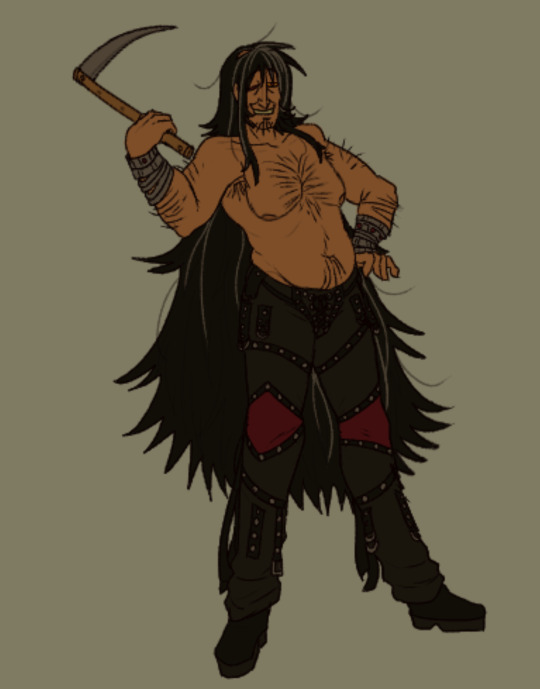
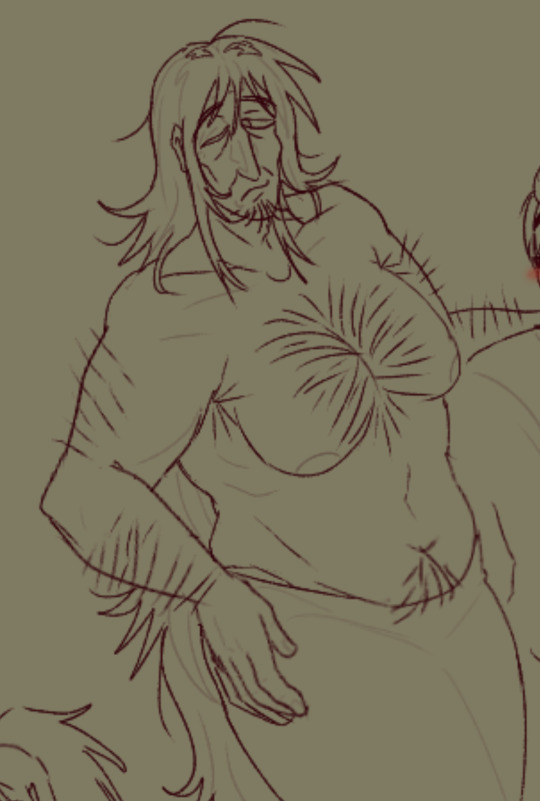
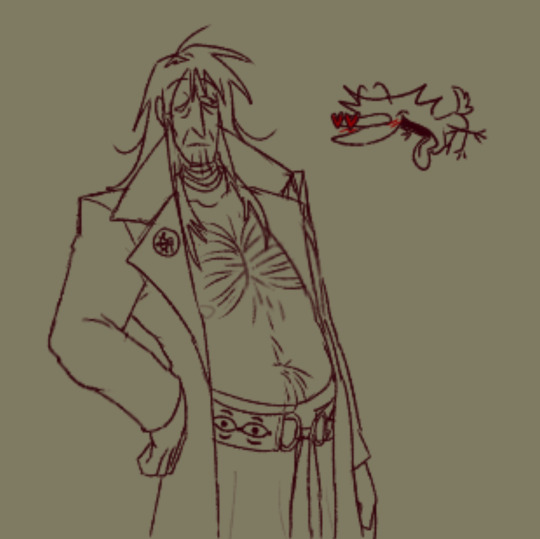
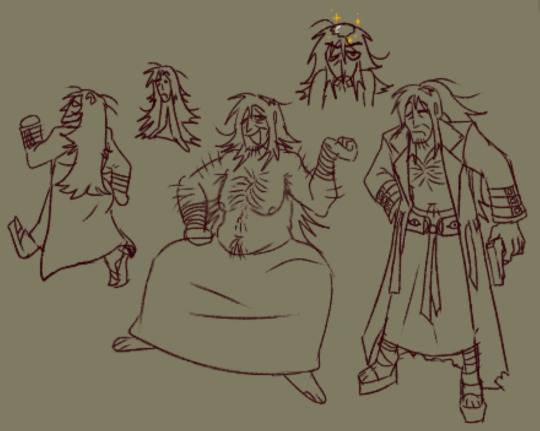
Ok I really gotta stop drawing this guy’s skinsona😭😭.. (ignore the bird.. pretend she isn’t there)
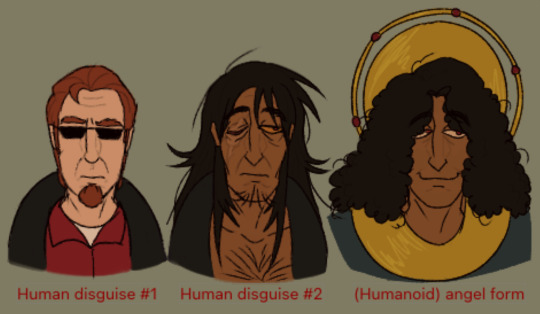
why do you have a gingersona as well?? 😭
#I’m so freaking done with this FREAK he’s like barely a character in the original game!!!!!#He’s just some silly voice lines and some edgy text on the level cards😡😡😡😡#I mean that is characterization… but like I don’t think he’s like.. an official character.. you know?#Believe it or not but I actually didn’t really like the demon theory at first#But then when I was first drawing p1 dude I was like “ok do I really want to portray this guy as a crazy violent mentally unwell man?”#Obviously I didn’t like that bc I’m mentally ill as well so I drew the idiot demon and now I’m in nightmare autism land#Anyway uh headcanon related to a drawing:: I think the demon used to be a guardian angel! That’s why his angel form resembles a human#Don’t know how this guy fell out of heaven exactly but he sure did fall.. they took his damn eye out with the halo😭 good lord! A bit brutal#I would love to speak about my thoughts on the demon but I’m not sure if anyone wants to read that.. 🤷#postal 1#postal 1997#postal 97#postal demon#digital art#digital drawing#digital doodle#doodle#doodles#drawing#drawings#art#my art#fanart#fan art#(I think he would have more skinsonas then that.. he’s a shapeshifter!!)#(Well in my headcanon he is…)#Oh I just realized I gotta tag the redux😭#postal redux#postal redux dude#redux dude
28 notes
·
View notes
Text

hello genhaku nation
#dr stone#gen asagiri#kohaku dr stone#genhaku#kohagen#this is quite rushed but im sick and also wanted to make sure i did this before the trend died so 🤷#my art#theyre in ryusuis closet btw
55 notes
·
View notes
Note
Terry's fantasy; having Sensei Wolf and Daniel fool around in front of him but the more and longer he thinks about it (it starts enjoyable, and sexy af), he starts to get jealous that Wolf is touching HIS DANNY BOY! And ruins his own fantasy LOL

At first he was like "my two favourite sexy people fighting for me🤩" and then he remembered how easy people fall for Daniel's maniac pixie karate twink energy😐
Why do you think we didn't get Wolf&Daniel scenes until their fight? He told him to say away from Daniel both because he knew Wolf can actually hurt him (sorry Dennis lmao) and because if he spent a few minutes looking into his bambi (there should be one wolf to Daniel's deer and it's not Wolf) eyes he would be gone for the world🤷
#maybe at first wolf thought it was vice versa and was very smug about it until he noticed what kind of glances he kept shooting at Daniel#and suddenly LaRusso has a new enemy even if he has no idea of the drama that was going on HAHAHAH#the real answer is will Wolf follow the pattern and fall for Daniel's maniac pixie karate twink energy#i mean you can NOT unconvince me that he wasn't at least impressed by the way Daniel was fighting#at least he lasted longer and better than Johnny🤷 idk why they did him so dirty here#silverusso#silverussowolf
21 notes
·
View notes
Text
Hi, hey, hello. Not writing this for sympathy or for attention, I just want to let you know that I love you all, and forgive me if I'm late with answers or I don't interact as much as I want too 😭 I just want to give kudos, comments and reblogs to your amazing works but sometimes I don't have much time 😭
So please forgive me if I miss something! 🙏
#I know i shouldn't ask for forgiveness#I mean everyone is busy/has a work life like me (except haters because they don't touch enough grass 🤷)#But I'm so tired 😩#I hope today I can answer the asks i got but I work all day and tonight I go out with friends#Social battery is 1%#Sigh i felt extrovert when I planned with friends#... Did you really read it all? Then come here 🫂 I love you so so much ❤️
42 notes
·
View notes
Text
An average a life series for grian lasts 7.75 episodes. He tends to make it decently far into a series without perma dying. So for this season I'm going to wait until the 4th episode before I start talking about my ideas for what he is based off. Then once the series is done I'll make a new version and compare the two.
Considering the nature of the series I expect it going in a chaos themed direction. He also has some "inside knowledge" so I'm going to lean even more heavily into the god aspects of his character. I tend to do that a lot already but idgaf.
Btw for my new followers who came for my transformers stuff don't worry I'm not switching hyperfixations yet. I got 5 major drafts in the making for you guys.
#watcher grian#i like the idea of him being the one that makes the games#life series#grian#I'm probably jinxing him with lasts really long comment#the ao3 curse caught me so it's ni.ce to be able to post again#(if you're wondering what happened i got hit by a car)#🤷#traffic series#trafficblr#traffic light series#did math for this#transformers
24 notes
·
View notes
Text

Here is is!
The last one in the trio to get all dressed up :]
#illustration#fanart#dhmis#don't hug me i'm scared#dhmis duck guy#duck guy#I don't know what this type of fashion is called either lol#I started out kinda looking at 70s fashion for ideas but then I just sorta. did what I felt like would fit#idk if they even really match or look like the same style now 🤷#this drawing's so red lol#well it is his favorite color#art#fav posts#outfits
257 notes
·
View notes
Text
okay sure he literally took a lightning bolt to the chest for you and she healed your nearly dead ass with magic water but whatever
#I just finished atla. I like it. it was good. apart from one or two things but we won’t go into that#I guess I ship it now? didn’t think I did but this was my take away so 🤷#zutara#atla#avatar the last airbender#my posts
56 notes
·
View notes